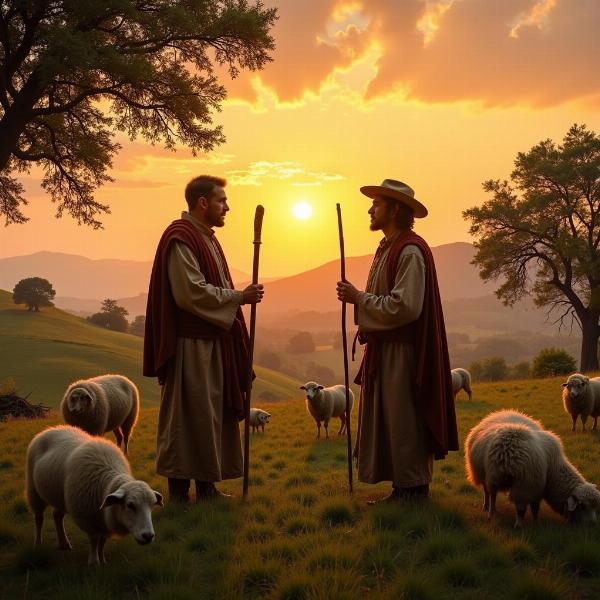The term “eclogue meaning in Hindi” often leads to a search for गीति, which is the closest general translation. However, understanding the true essence of an eclogue requires delving deeper than a simple dictionary definition. This article explores the nuances of this literary form, its historical context, and its significance in both Western and Indian literary traditions. We’ll examine how eclogues, while originating in a different cultural context, can be understood and appreciated within the framework of Hindi literature.
Unpacking “Eclogue”: Beyond Simple Translation
While गीति (geeti) offers a broad translation for “eclogue” as “song” or “lyric,” it doesn’t capture the specific pastoral element inherent in this genre. An eclogue is more than just a song; it’s a short pastoral poem, often a dialogue between shepherds or other rural figures, idealizing rural life and exploring themes of love, loss, and nature. The word itself comes from the Greek ἐκλογή (eklogē), meaning “selection” or “excerpt,” reflecting the curated, stylized nature of these poems. This idealized portrayal of rural life contrasts with the complexities of urban existence, offering a romanticized escape into a simpler world.
 Shepherds in Dialogue
Shepherds in Dialogue
The Historical Roots of Eclogues: From Theocritus to Virgil
Eclogues find their roots in the Hellenistic poetry of Theocritus, a 3rd-century BCE Greek poet whose Idylls depict scenes of pastoral life. These poems established the conventions of the genre, including the use of dialogue, idealized settings, and recurring themes of love and nature. Later, Roman poet Virgil adapted and refined the form in his Eclogues, also known as Bucolics, infusing them with political and social commentary veiled in pastoral imagery. This layered approach added depth and complexity to the genre.
Eclogues in Indian Literature: Parallels and Adaptations
While the term “eclogue” isn’t directly native to Indian literary traditions, similar themes and motifs can be found in various forms of poetry and storytelling. Sanskrit literature, for example, abounds with descriptions of nature and rural life, often intertwined with religious and philosophical reflections. The concept of shringar, the aesthetic enjoyment of love and beauty, resonates with the romantic elements often present in eclogues. Furthermore, folk songs and ballads from various regions of India celebrate the rhythms of rural life, echoing the pastoral spirit of the genre.
How do you say Eclogue in different Indian languages?
While गीति (geeti) serves as a general translation in Hindi, variations exist in other Indian languages. Exploring these linguistic nuances further enhances our understanding of how the concept of pastoral poetry is perceived across different cultural contexts within India. This exploration demonstrates the richness and diversity of Indian languages and their capacity to adapt to and interpret literary concepts from other traditions.
Why is understanding the meaning of Eclogue important?
Appreciating the meaning of “eclogue” opens a window into a rich literary tradition, allowing readers to engage with texts from a different perspective. Understanding the historical context and conventions of the genre enhances our ability to interpret the subtle nuances and layered meanings embedded within these seemingly simple poems. This knowledge enriches our understanding of both Western and Indian literature and allows us to appreciate the universal themes of love, loss, and the relationship between humans and nature.
Conclusion: “Eclogue Meaning in Hindi” – More Than Just a Word
The quest for “eclogue meaning in Hindi” goes beyond simple translation. It’s an invitation to explore the rich literary and cultural history of pastoral poetry. While गीति serves as a starting point, understanding the nuances of the genre and its parallels in Indian traditions offers a deeper appreciation of this unique form of poetic expression. Exploring these connections enriches our understanding of literature and fosters cross-cultural appreciation.
FAQ:
- What is the main characteristic of an eclogue? The idealization of rural life and the use of pastoral imagery.
- Who are some famous writers of eclogues? Theocritus and Virgil are considered the most influential figures in the development of the genre.
- Does Indian literature have an equivalent to the eclogue? While not a direct equivalent, similar themes and motifs can be found in various forms of Indian poetry and storytelling.
- Why is the setting important in an eclogue? The idyllic rural setting provides a backdrop for exploring themes of love, loss, and the human relationship with nature.
- What is the significance of dialogue in eclogues? Dialogue between shepherds and other rural figures allows for the exploration of various perspectives and adds dramatic interest to the poems.
- How does the term “eclogue” relate to its Greek origin? The Greek word ἐκλογή (eklogē) means “selection” or “excerpt,” reflecting the curated and stylized nature of these poems.
- What is the difference between an eclogue and a geeti? While geeti refers broadly to “song” or “lyric,” an eclogue specifically denotes a short pastoral poem with distinct conventions.
Meaning-Hindi.in is your premier source for professional Hindi translation services, specializing in business, legal, technical, website localization, educational, and specialized content. We offer accurate, culturally sensitive translations that bridge linguistic and cultural gaps. Whether you need to translate a legal document or localize your website for an Indian audience, our team of expert linguists can help. Contact us today at [email protected] or call us at +91 11-4502-7584 to discuss your translation needs. Meaning-Hindi.in is committed to providing high-quality language solutions tailored to your specific requirements.